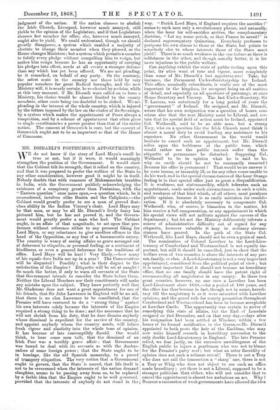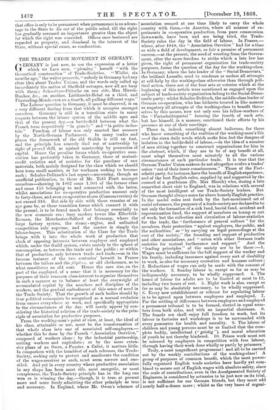MR. DISRAELI'S POSTHUMOUS APPOINTMENTS.
lATE do not know if the story of Lord Mayo's recall be true or not, but if it were, it would amazingly
strengthen the position of the Government. It would show that the Cabinet felt its strength, that it relied on the country, and that it was prepared to prefer the welfare of the State to any other consideration, however good it might be in itself. Nobody doubts that with rumours of Mohammedan troubles Eastern question" once more open,—a question which, be it remembered, involves alike Russia and the Caliphate,—the Cabinet would greatly prefer to see a man of proved first- class ability in the Indian Viceroy's chair. Lord Mayo may be that man, or may be all Mr. Disraeli's lively fancy has pictured him, but he has not proved it, and the Govern- ment would greatly prefer a man who had. The Cabinet ought, in an affair of that magnitude, to act upon that pre- ference without reference either to any personal liking for Lord Mayo, or any reluctance to give needless offence to the head of the Opposition, or any fear of a bureaucratic outcry. The country is weary of seeing affairs so grave arranged out of deference to etiquette, or personal feeling, or a sentiment of kindliness, or even a general deference for the traditions of office. Lord Mayo will be hurt ? Very likely,—how many of his equals does India use up in a year ? The Conservatives will be disgusted ? Possibly ; what is their disgust to the satisfaction of the Empire ? Etiquette will be set at naught ? So much the better, if only to warn all servants of the State that Government intends to consider the State before them. Neither the Liberal Members nor their constituents will make any mistake upon the subject. They know perfectly well that Mr. Gladstone does not want a great appointment for one of his friends, that Sir John Lawrence in England will be no aid, that there is no clan Lawrence to be conciliated, that the Premier will have ventured to do a "strong thing" against his ownS interests solely because the interests of the Empire required a strong thing to be done ; and the assurance that he will not shrink from his duty, that he dare dismiss anybody whose dismissal is expedient for the service of the country, and appoint anybody whom the country needs, will infuse fresh vigour and elasticity into the whole tone of opinion. It has become of late contemptibly flaccid. One would think, to hear some men talk, that the dismissal of an Irish Peer was a terribly grave affair ; that Government was bound to deal with its servants as with the Ambas- sadors of some foreign power ; that the State ought to be in bondage, like the old Spanish monarchy, to a parcel Of trumpery etiquettes. The very notion that a Government ought to govern, that the State is sacred, that life itself is not to be reverenced when the interests of the nation demand slaughter, seems to be passing away from us, to be replaced by a feeble idea that the Empire ought to be well governed, provided that the interests of anybody do not stand in the way. "Perish Lord Mayo, if England requires the sacrifice!" seems to such men only a revolutionary phrase, and naturally, when the hour for self-sacrifice arrives, the complementary doctrine, "Let my name perish, so that France be saved:" is declared supererogatory Quixotism. Everybody professes to postpone his own claims to those of the State, but points to somebody else to whose interests those of the State must yield ! There is as much weakness in the one failure as there is selfishness in the other, and though morally better, it is far more injurious to the public welfare.
Can anything exhibit the state of public feeling upon this point, its- utter want of tone and vigour, more completely than some of Mr. Disraeli's last appointments? Take, for instance, the Permanent Under-Secretaryship for Ireland. This office, nominally subordinate, is really one of the most important in the kingdom, its occupant being on all matters of detail, and especially on all questions of patronage, at once Home Secretary and Viceroy. The last Under-Secretary, Sir T. Larcom, was notoriously for a long period of years the " government " of Ireland. He resigned, and Mr. Disraeli, aware that his own resignation was a question of hours, con- scious also that the next Ministry must be Liberal, and cer- tain that its special field of action must be Ireland, appointed Col. Wetherall, said to be an able man, but a strong Tory, who on a question like the Irish Church must think it almost a moral duty to avoid lending any assistance to his superiors. No other Government in the world would hesitate to cancel such an appointment, but Mr. Disraeli relies upon the feebleness of the public tone, which would rather see the public interest suffer than the etiquette of permanence be disturbed. Supposing Col. Wetherall to be in opinion what he is said to be, why on earth should he not be summarily removed ? Because his office is permanent ? That would be no answer if he were insane, or incurably ill, or for any other cause unable to do his work, and in the special circumstances of the hour Orange feeling is in that special office just as great a disqualification. It is weakness, not statesmanship, which tolerates such an appointment, made under such circumstances, in such a crisis, and weakness of that kind which, of all others, most paralyzes public opinion, because it is so easily mistaken for conside- ration. If it is absolutely necessary to compensate Col. Wetherall, who, of course, is blameless in the matter, let him receive a full compensation, or any appointment in which his special views will not militate against the success of the department ; but let not the Ministry deliberately tolerate a source of administrative difficulty out of regard for any etiquette, however valuable it may in ordinary circum- stances have proved. In the path of the State Col. Wetherall, like Lord Mayo, should not be even a grain of sand.
The nomination of Colonel Lowther to the Lord-Lieu- tenancy of Cumberland and Westmoreland is not equally im- portant, but still it should be cancelled, just to show that the welfare even of two counties is above the interests of any per- son, family, or clan. A Lord-Lieutenancy is not a very important appointment, considered from the political point of view ; but it is most important that it should not become an hereditary office, that no one family should have the patent right of recommending all magistrates in any county. In these two great counties, however, no one save a Lowther has been Lord-Lieutenant since 1688,—for a period of 180 years, and the office has thus become in fact, though not in name, heredi- tary till the magistracy is as it were saturated with Lowther opinions, and the grand rule for county promotion throughout Cumberland and Westmoreland has been to become acceptable at Lowther Castle. The opportunity was certain to arrive of remedying this state of affairs, but the Earl of Lonsdale resigned on 2nd December, and on that very day,—days after his resignation had been settled at Windsor, within a few hours of its formal notification to the Queen,—Mr. Disraeli appointed to both posts the heir of the Earldom, who may now write himself seventh in hereditary succession to the only double Lord-Lieutenancy in England. The late Premier relied, we fear justly, on the excessive unwillingness of the English public to injure a gentleman who was not to blame for the Premier's party zeal ; but what an utter flaccidity of
opinion does not such a reliance reveal! There is not a Tory who does not call the transaction a "sharp" one, there is not a Tory or Whig who does not object to see such an office
made hereditary ; yet there is not a Liberal, supposed to be a stronger politician than either, who will not consider that to cancel the appointment is almost too audacious an act. Why ? Because a succession of weak governments have allowed the idea that office is only to be permanent when permanence is an advan- tage to the State to die out of the public mind, till the right has gradually assumed an importance greater than the object for which the right was conceded. Offices once bestowed are regarded as property, and dismissal in the interest of the State, without special cause, as confiscation.







































 Previous page
Previous page